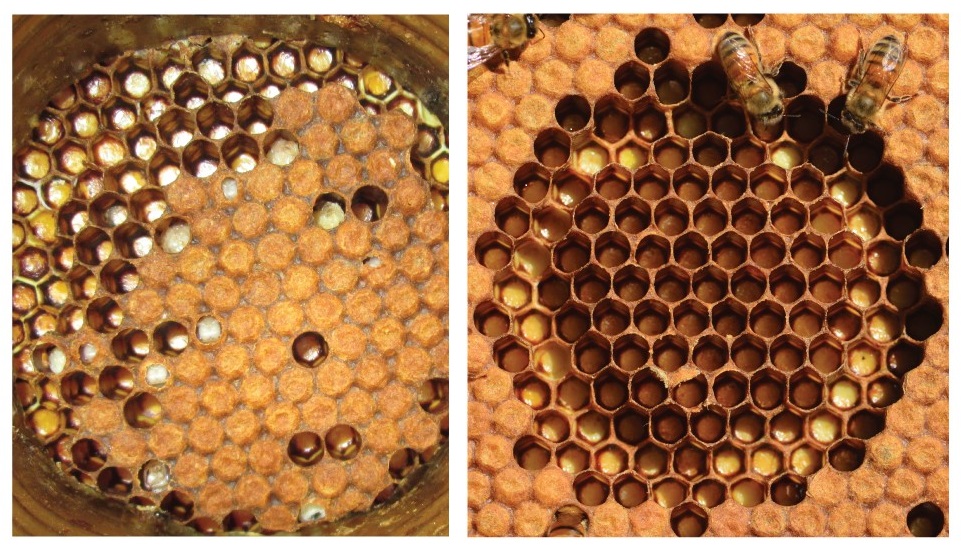York University research may help save rapidly declining bees
TORONTO, February 15, 2019 – The key to breeding disease-resistant honeybees could lie in a group of genes – known for controlling hygienic behaviour – that enable colonies to limit the spread of harmful mites and bacteria, according to genomics research conducted at York University.
Some worker honeybees detect and remove sick and dead larvae and pupae from their colonies. This hygienic behaviour, which has a strong genetic component, is known to improve the colony’s chance of survival.
The researchers narrowed in on the “clean” genes that influence this behaviour to understand the evolution of this unique trait.
The finding, published today in the journal Genome Biology and Evolution, could lead to a new technique for use in selective breeding programs around the world to enhance the health of honeybees.

Researchers looked for areas that differ between the unhygienic bees (left) and hygienic bees (right).
“Social immunity is a really important trait that beekeepers try to select in order to breed healthier colonies,” said Professor Amro Zayed, a bee genomics expert in the Department of Biology, Faculty of Science. “Instead of spending a lot of time in the field measuring the hygienic behaviour of colonies, we can now try breeding bees with these genetic mutations that predict hygienic behaviour.”
Statistics Canada estimates that honeybee pollination contributes between $3.15 to $4.39 billion per year to the Canadian economy including some of Canada’s most lucrative crops like apples, blueberries and canola. In Canada, and around the world, beekeepers have experienced higher than normal colony losses. Last winter, Canadian beekeepers lost up to 33 per cent of their colonies.
“This study opens the door to using genomics to breed healthier and disease-resistant colonies that have higher social immunity,” explained Zayed. “This is of huge importance to the greater community of geneticists who are interested in understanding the genetics of this novel trait.”
Zayed worked on the study with 13 bee biologists from York University, University of British Columbia, University of Manitoba, and Agriculture and Agri-Food Canada.
In the study, the biologists sequenced the genomes of three honeybee populations; two of them bred to express highly hygienic behaviour and a third population with typical hygiene. Brock Harpur, Zayed’s former doctoral student who is now an assistant professor at Purdue University’s Department of Entomology, examined the genomes of bees from each of these three populations and looked for areas that differ between the unhygienic and hygienic bees. Harpur pinpointed at least 73 genes that likely control this hygienic trait.
“Now that we have identified these candidate genes, we can look for the mechanisms of hygienic behavior and begin to develop tools for beekeepers to breed healthier colonies,” explained Harpur.
The biologists are planning to pilot a marker-assisted breeding program for hygienic behaviour, in which bees are selected for breeding based solely on their genetic information.
“We think there is a lot of potential here of breeding disease-resistant colonies with a simple genetic test,” said Zayed.
York University champions new ways of thinking that drive teaching and research excellence. Our students receive the education they need to create big ideas that make an impact on the world. Meaningful and sometimes unexpected careers result from cross-disciplinary programming, innovative course design and diverse experiential learning opportunities. York students and graduates push limits, achieve goals and find solutions to the world’s most pressing social challenges, empowered by a strong community that opens minds. York U is an internationally recognized research university – our 11 faculties and 25 research centres have partnerships with 200+ leading universities worldwide. Located in Toronto, York is the third largest university in Canada, with a strong community of 53,000 students, 7,000 faculty and administrative staff, and more than 300,000 alumni.
York U's fully bilingual Glendon Campus is home to Southern Ontario's Centre of Excellence for French Language and Bilingual Postsecondary Education.
Media Contact: Vanessa Thompson, York University Media Relations, 416-736-2100 ext. 22097, vthomps@yorku.ca

